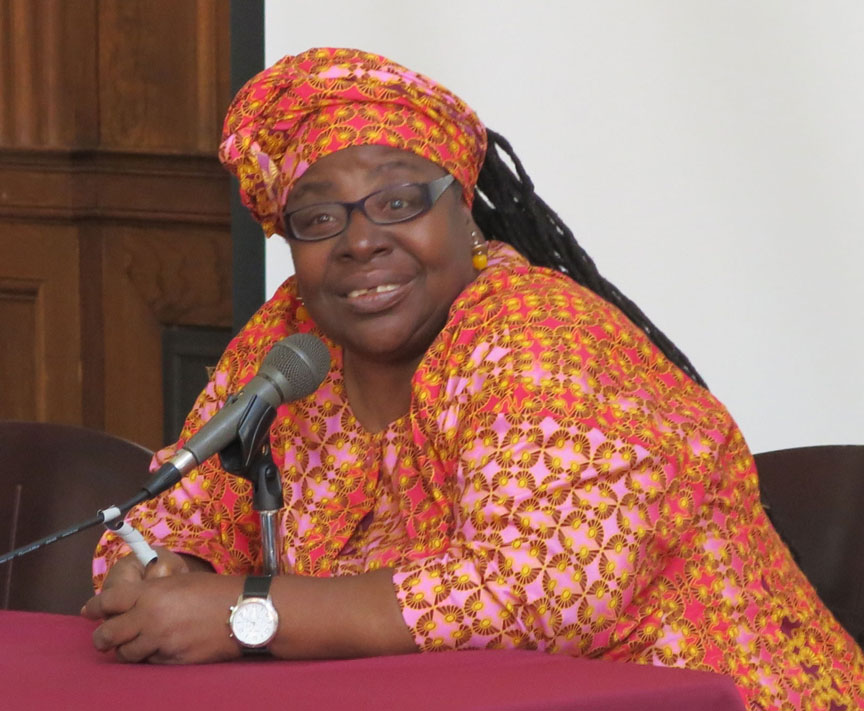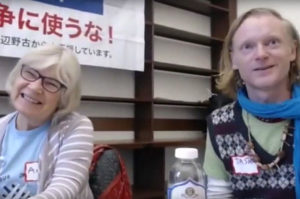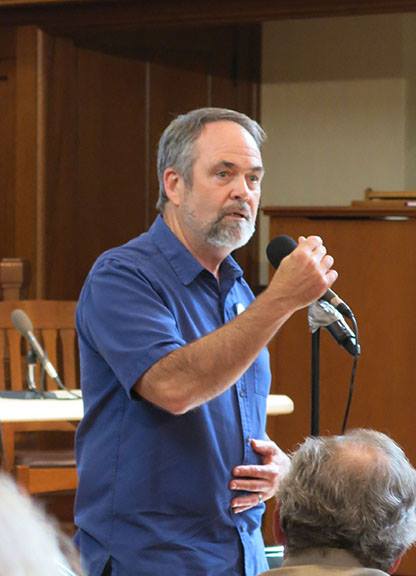More Than a Paycheck,
REFUSING to PAY for WAR
December 2017/January 2018
Contents
 White Supremacy in the Age of Trump Excerpts from a talk by Loretta Ross
White Supremacy in the Age of Trump Excerpts from a talk by Loretta Ross- Still Learning By Ruth Benn
- Counseling Notes WTR Counselor Conference Calls • Tax Debt Turned Over to Private Collection • Higher Charitable Deductions for Hurricane Relief • Under Review…
- Many Thanks to everyone who supports NWTRCC with their volunteer time or financial donations and to the following groups for recent donations
- Network List Updates
- State Violence, Climate Change, and Divesting from War By Jason Rawn
- War Tax Resistance Ideas and Actions WTR Outreach Reports: We’re All Field Organizers • Facts for Your Flyers • Puerto Rico: A Redirection Opportunity • A New Hope (Sam’s College Tour)
- Resources
- NWTRCC News Voices of Resistance • Coordinating Committee Decisions + Nominations Open for Adcomm
- PROFILE Time for a Change By Ruth Benn
Click here to download a PDF of the December/January issue
White Supremacy in the Age of Trump
Excerpts from a talk by Loretta Ross
Loretta Ross gave the keynote address at the War Tax Resistance Gathering in Amherst, Massachusetts, on November 4. She teaches “White Supremacy and Appropriate Whiteness in the Age of Trump” as a Visiting Assistant Professor of Women’s Studies at Hampshire College in Amherst, Massachusetts.
Note: These excerpts are a small portion of her talk; the full version is on NWTRCC’s YouTube channel linked at nwtrcc.org. We’ve left out most ellipses for ease of reading.
I have the immense privilege of having 25 of the brightest kids you will ever see eagerly embracing a strategy for deconstructing white supremacy from a place of whiteness. They are students of pretty good privilege. If they wanted to they could just melt back into society, and no one would ever offer a critique of what they are doing because it would be usual, expected, customary. And yet they are choosing to learn how to become active resisters. …To me that’s why this historical moment is so precious, because those of us who have been objects of enslavement and genocide, we’ve been saying white supremacy is in America’s DNA. But the fact there is a significant portion of the white population that’s understanding that the currency of white supremacy is counterfeit is new and different.
I have studied the fascist movement for the last 30 years. In the 1980s and ‘90s my job was to monitor hate groups at the Center for Democratic Renewal, formerly known as the National Anti-Klan Network… under the leadership of Rev. C. T. Vivian. [He] came to work one day and literally told the staff “if you ask people to give up hate then you have to be there for them when they do.” I started talking to these people who had been in the Klu Klux Klan and the militia movement, the Aryan nations, etc. It was probably the most challenging and interesting work that I ever did, because I found out that once you got to know someone in the hate movement it was really hard to continue to hate them. I used to say “Oh they’re like roaches. They come out at night when you turn the lights out.” And then I saw them as human beings, hurting human beings, but human beings nonetheless. Of course this just messed up my thinking because if a Black woman can’t hate the Klan, who’s left to hate?
In this current epoch we’re talking about Trump supporters. The perspective I’m trying to offer the students I’m teaching and the audiences I get to speak to about white supremacy is that we are going to have to take a longitudinal view of what we are facing, because Trump was so clearly an outcome, not a cause.
What we are witnessing is what happened after the success of the civil rights movement of the 1960s. The people who felt they had lost control of this democracy and their determination to protect white privilege and white supremacy developed a multi-decade plan to regain power. To implement this plan they pulled together not only people who had been resistant to the civil rights movement, the diehard segregationists, but they also thought that they needed to foment culture wars against LGBT rights, women’s rights, abortion rights, immigrants, workers’ rights, environmental justice. They just perfected the politics of white grievance against modernity.
[I]n about thirty years the demographics are going to shift so thoroughly that white people will no longer be the majority in America. So what we see now is their total deconstruction of the mechanics of democracy, because they no longer think democracy works in their best interest anymore. Not that we ever had a perfect democracy to begin with, but
when you tie their attacks on voting rights, gerrymandering, the media, education, government regulation of corporations, what is truth even — facts — science, all of that, you get a very alarming dystopian picture, that these people are deconstructing the very mechanisms we count on protecting egalitarian democratic society, and they are trying to create a society that allows an embittered minority to stay in control.
I’ll stop and define it: White supremacy is a body of ideas, it is not a race of people. It’s a body of ideas that is racism, homophobia, Christian nationalism, ableism, sexism, anti-environmentalism. There are so many parts of this thing called white supremacy that I think the most frequent mistake people make is working on only one aspect of it, and thinking they are seeing the whole thing. You have to see it as a totalizing system, a toxic sea in which we all swim, so that in the final analysis every white person is not a white supremacist and every white
supremacist is not white.
That’s what we face, and my question is, are we who are trying to fight the ravages of the white supremacist movement sufficiently awake enough to realize that we need our own multi-decade plan?
For me, fighting white supremacy is what I’m against, but the vision that I want to talk about is a vision of a world based on human rights. That’s what I’m fighting for. I really like the fact that in 1948 the universal declaration of human rights was shepherded in under the leadership of former first lady Eleanor Roosevelt to allow us to define societies in which people treat each other based on our need for each other, our human interdependence, the need for a cultural caring as opposed to atomization, individualism, alienation, which is what our present society operates on.
We should have been building a U.S.-based human rights movement, holding our government accountable for its human rights violations here and around the world. We should have been organizing ourselves as the women’s rights wing of the human rights movement, working with the anti-racist wing of the human rights movement, and the peace wing of the human rights movement, and the environmental wing of the human rights movement. Instead we’ve been in identity silos acting like we’re the divided and the conquered, and our enemies have just taken advantage of that. [W]e’re so engaged in a call-out culture, criticizing each other’s activism…that we forgot to be strategic together and share a vision.
There is no way you can live in the south and not know the names of the people who died — black, white, women, men — who died for your right to do this work. So when you have those kinds of dates in your soul and on your shoulders you tend to become overly serious, humorless… I couldn’t even go to a movie without offering a critique of its racial and gender politics. It was overwhelming, until Leonard Zeskind told me, “Loretta, lighten up. Fighting Nazis should be fun, being a Nazi is what sucks.” And I’ve never forgotten that phrase.
When you’re fighting on the side of justice and truth and righteousness it’s a perfect struggle. You don’t have to be perfect. The struggle is. You can bring your imperfect self to the work. That’s what we need to dismantle white supremacy, it’s white people who are self-critical
enough and brave enough to take risks and learn new mistakes as they go along.
Loretta Ross was a co-founder and the national coordinator of the Sister-Song Women of Color Reproductive Justice Collective from 2005-2012. She is an expert on women’s issues, hate groups, racism and intolerance, human rights, and violence against women. Her work focuses on the intersectionality of social justice issues and how this affects social change and service delivery in all movements.
Still Learning
By Ruth Benn
For this last column during Thoreau’s bicentennial year, I wanted to make note of “This Ever New Self: Thoreau and His Journal,” an exhibit currently on display at the Concord (MA) Museum. It touches on many aspects of his life, and I learned a lot, including that his mother and a sister were both abolitionists, sharing his disdain of slavery. I also learned about Margaret Fuller, who hosted a discussion group that included Emerson and Thoreau. She was hired by Emerson to edit the transcendentalist journal, The Dial. This got me thinking about the earlier column here by Larry Rosenwald cautioning about Thoreau’s legacy in light of his male-centered writings. Still, the fact that Fuller was a strong advocate of women’s rights and shared this circle with Thoreau was remarkable to me.
At the end of the exhibit is Louisa May Alcott’s poetic tribute to Thoreau on his death at 44 in 1862. So the author of Little Women had a crush on Thoreau? It’s high time I read a biography of these people! Here are a few lines from “Thoreau’s Flute”:
Spring mourns as for untimely frost;
The bluebird chants a requiem;
The willow-blossom waits for him;
The Genius of the wood is lost.
Counseling Notes:
WTR Counselor Conference Calls
One idea that came up at the recent WTR gathering in Massachusetts was to have periodic conference calls for counselors and contacts in the NWTRCC Network. The call would offer technical updates and answer questions to keep our counselors more up-to-date and able to respond accurately to queries. A date and time will be announced soon, or contact the NWTRCC office if you are interested in becoming a WTR counselor or contact for your area.
Tax Debt Turned Over to Private Collection
In the last issue of this newsletter we noted no news of WTRs having their debt sent to private collection. As soon as the issue was printed, our consultant Sam Koplinka-Loehr opened her mail to find just such a letter. The IRS sends a letter with the name of the company assigned your debt, and then the company follows up with a first notice. Keep us posted with any such news and stories of “what happened next.”
Higher Charitable Deductions for Hurricane Relief
Congress has lifted some limits on how much you can deduct for charitable contributions in 2017 — when those contributions are made to hurricane relief efforts. This may allow you to greatly reduce or even eliminate your federal income tax, something that is not usually easy to do. Ordinarily, the law limits these deductions to a percentage of your Adjusted Gross Income (20%, 30%, or 50% depending on the nature of the donation). Also, this deduction is an “itemized” deduction and is subject to limits on how much of such deductions you can take. The new law removes those limits for donations made between August 23 and December 31, 2017, to an organization involved in hurricane relief efforts in the disaster areas proclaimed in response to hurricanes Harvey, Irma, and Maria.
In addition, if you have an IRA and have reached 70½, there is no tax on required minimum distributions if you donate them directly to charity. Check out the rules, and take advantage of this if you can afford to do so.
Under Review…
We’re watching the progress of the Trump administration’s tax overhaul to see what the final version means for WTRs (aside from hurting just about all middle and lower income people). Filers may lose important means of lowering their taxable income, such as deductions for medical expenses or for state and local taxes, and grad students could see tuition waivers count as income. And we’re trying to keep up with changes to the Affordable Care Act. One version of the proposed bill removes the mandate for health insurance and thus the penalty for not complying with the ACA. Right now the IRS is still planning to reject forms that do not include required health care information and to add the penalty to tax bills. Keep us updated with your real-life stories too.
— Thanks to David Gross for contributions. His Picket Line blog can be read at sniggle.net/TPL.
Many Thanks
Thanks to each of you who has responded to our November appeal — and in advance to each of you who is about to send that check! Remember, you can also donate online through Paypal (not tax deductible) or Resist (tax deductible) by clicking on the “Donate” button at nwtrcc.org. (Please let the NWTRCC office know if you use Resist.)
Special thanks for Affiliate dues payments from:
- Episcopal Peace Fellowship
- Michiana War Tax Refusers, South Bend, IN
- New England War Resisters League, Norwich, CT
- St. Lawrence Catholic Worker House, Kansas City, KS
Network List Updates
The Network List of Affiliates, Area Contacts, Counselors, and Alternative Funds is updated and online at nwtrcc.org, or contact the NWTRCC office (nwtrcc@nwtrcc.org or 1-800-269-7464), if you would like a printed list by mail.
Welcome to our newest affiliate, Peace Pentagon in Independence, Virginia
Click on the icons at nwtrcc.org to find us on
Facebook • Twitter • YouTube • Pinterest
and to join our elist and listserve
Advertise to Activists! See the advertising rates for this newsletter or contact the editor at (800) 269‒7464.
Consider a Bequest
A bequest costs nothing now, yet it may give you great satisfaction to know that your gift will live on in NWTRCC. Simply name NWTRCC as the beneficiary of a portion of your estate or of particular assets in your estate, or contact NWTRCC for arrangements through one of our 501c3 fiscal sponsors: (800) 269-7464 or nwtrcc@nwtrcc.org.
State Violence, Climate Change, and Divesting from War
By Jason Rawn
“The damage to our relationships with the capital markets has been substantial, impairing access to financing and increasing their cost of capital and ability to fund future projects.”
—From a corporate suit over divest campaigns
NWTRCC has promoted “Divest from War, Invest in People” in recent years. Our workshop (titled like this article) at the November gathering (see p. 6) expanded on that theme and highlighted the vision we’re up against under the Department of “Defense”/War. According to the Joint Chiefs of Staff‘s Joint Vision 2020: America’s Military — Preparing for Tomorrow, “Full Spectrum Dominance” is the stated goal of U.S./corporate warmakers, and the Department of War has something like 2.8 million people earning a living as cogs in that warmaking machine.
We were fortunate to have with us Paki Wieland, fresh from CodePink’s “Divest from the War Machine” campaign summit in Washington, DC. She shared a document outlining the moral imperative to divest from the manufacturers of nuclear and conventional weapons as well as a model resolution for municipal divestment from these corporations. She also suggested that a campaign like “Solarize Our City” might gain traction and funding if presented in terms of “defense,” an idea WTRs might get behind with redirected “tax obligations.”
Our conversations touched on ideas including a free press (or lack thereof), the possibility of local broadsheets to convey accurate information and expose the systematic control of information, the punishment of journalists and others whose work dares to challenge corporate control, the need for well-documented information about how prioritizing war funding affects every other issue, and the fact that climate change is a vital issue to organize around.
By emphasizing the fact that the Department of War has the largest carbon bootprint on the planet and is most likely the biggest single climate criminal, it should be easy to find the intersectional sweet spots among activists from diverse sectors. Everyone is affected by the worsening climate chaos, and everyone can probably think of better ways to invest the trillion-plus dollars of our common wealth misinvested by and for U.S./corporate warmakers each year.
This author is not the only person who passes in and out of varying degrees of despair, but also not the only person who has not given up. Resistance to Full Spectrum Dominance around the world is inspiring — and contagious, whether they are the elders daily defending Okinawa’s Oura Bay against the expansion of the U.S.’s Camp Schwab; activists working to counter the increasing militarization of U.S. borders; or the Penobscot, Lakota, and other Indigenous people and their allies working to reclaim stewardship of ancestral lands and waters. Around the world, the courage, vision, and dedication of longtime resisters strengthens us all.
But it’s essential and inevitable that we taste success. Divestment campaigns are increasingly providing those tastes. According to an interview in Yes! Magazine with indigenous activist Jackie Fielder, since Standing Rock “more than a dozen cities have taken some form of action to move their money out of Wall Street.” And because of these and similar empowering successes, Energy Transfer Partners sued Greenpeace, Earth First! and other partners in the struggle against DAPLrelated corporate control. The SLAPP (strategic lawsuit against public participation) included this statement: “The damage to our relationships with the capital markets has been substantial, impairing access to financing and increasing their cost of capital and ability to fund future projects.”
So it’s clear that divestment works, that it’s an actual threat to the aims of the power elite. In addition, the recent decision by Judge Robert Tiffany to allow use of a climate change-centered “necessity” defense in a Minnesota case where Emily Johnston and Annette Klapstein briefly shut down a fossil fuel pipeline also bodes well for antimilitarism activists.
We are all privileged — at least on paper — to act to uphold the many laws brushed aside in pursuit of Full Spectrum Dominance. No one tactic will prove decisive. WTRs and others working to counter Full Spectrum Dominance must adapt our knowledge, experience, and tactics so we can work synergistically with vital, successful, ever-evolving campaigns spanning the globe. ASAP!
Together we stand, Divided we crawl.
Contact the NWTRCC office (nwtrcc@nwtrcc.org, 1-800-269-7464) to order a free copy of NWTRCC’s “Divest from War, Invest in People” organizing kit.
Jason Rawn is not a fan of weather modification/warfare or the “tax obligations” that help pay for these technologies of mass destruction. He advocates divestment from Full Spectrum Dominance.
War Tax Resistance Ideas and Actions
Outreach Reports: We’re All Field Organizers
Preston, Iowa: Lincoln Rice of Milwaukee War Tax Resistance held an introduction to WTR workshop at a Midwest gathering of Catholic Workers in mid-September. A group of almost 20 Catholic Workers, mostly in their twenties, had great questions and accosted Lincoln with additional questions the remainder of the gathering. Many of the workshop attendees plan on making above the taxable limit. They have kids or plan on having kids, paying jobs, and are interested in cooperatives, owning a small business, or being on a farm. Since Catholic Workers
have traditionally practiced WTR by earning under the taxable limit, methods for resisting the collection and payment of federal taxes was new for most of the group.
Houston: Jerry Maynard of Campaign Nonviolence-Houston reports that they held a screening of NWTRCC’s film Death and Taxes, and he passed out lots of info on WTR at the Houston Anarchist Bookfair in September. They are holding a WTR 101 gathering on December 8 and
hoping this will turn into a collective that focuses on education, outreach, and resistance regarding war taxes.
Washington, DC: North Carolina WTR Bill Ramsey was involved with planning and participating in “From Protest to Resistance: On the 50th Anniversary of the October 1967 March on the Pentagon,” sponsored by the Vietnam Peace Commemoration Committee, vietnampeace.org. Ruth Benn attended part of the event and made NWTRCC literature available, and then skipped over to CodePink’s Divest from the War Machine Summit, which was also in DC the weekend of October 21-22. CodePink’s new campaign focuses on divesting from corporations that do business with the Pentagon, whether boycotting products, removing your investments, or convincing your college, city, or pension fund to remove their investments from those corporations. NWTRCC is an endorser of the campaign and will work in parallel promoting divestment from war taxes too.
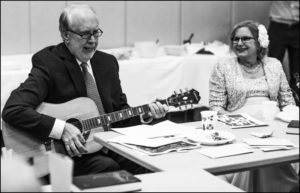
Longtime WTR and Heartland Peace Tax Fund member Susan Miller married Mel Lehman on November 4 in Susan’s hometown of Newton, Kansas. They met when Susan attended a NWTRCC meeting in New York in November 2013, and their wedding was held on November 4, when many of us were at the Amherst gathering. At the New York City reception (left), rather than give a speech, Mel led a group sing of peace songs. Many in attendance were from the Manhattan Mennonite Fellowship or connected with Mel’s group Common Humanity. At each event there were guests (more than a few in NYC) who spoke about their connection to Susan through local or national war tax resistance organizing. Congratulations, Susan and Mel! Photo by Ed Hedemann.
Facts for Your Flyers
Newly released figures from the Pentagon say that the U.S. has spent $250,000,000 every day for the past 16 years on its Terror War. That doesn’t include what’s being spent by off-the-books secret agencies (where Congress hides a lot of Terror War spending), and it also doesn’t count veterans’ benefits (currently $46,000,000 per day for Terror War vets). Harper’s Index calculates the average income taxes paid for the wars by an American since 2001 at $7,170.
Puerto Rico: A Redirection Opportunity
The crisis in Puerto Rico following the devastation of Hurricane Maria and the unhurried federal response had war tax resisters on our listserve offering suggested groups for redirection donations. North Carolina friend Carlos Steward shared some thoughts on the crisis as he sponsored a benefit art auction at his Flood Gallery in Asheville:
“My in-laws on the island still do not have electricity or water and other basic needs. They have a small generator that can keep lights running a few hours of the day. There is no quick fix for the problem as there are no power poles available to solve their problem. They were
told that maybe in four months there would be a pole available.
“Now that the military has spent trillions of dollars on long flight bombers, satellite surveillance, and floating airfields, the U.S. bases in Puerto Rico are no longer needed to protect the Panama Canal (on land stolen from Columbia after the Spanish American War). As a result of the base closings, the U.S. government feels free to ignore the island’s plight, instead focusing on the debt imposed on the island (caused by corporate greed). This is a thinly masked capitalistic effort to buy Puerto Rico cheaply for corporate expansions and resort developments
of the extreme Upper Class.”
— Carlos Steward
A New Hope (Sam’s College Tour)
By Sam Koplinka-Loehr
 Note: For the Star Wars fans in the network, you can watch this post instead of reading it! (Go to tinyurl.com/StarWarsWTR).
Note: For the Star Wars fans in the network, you can watch this post instead of reading it! (Go to tinyurl.com/StarWarsWTR).
A long time ago (not so long actually, it was only in October of this year) in a galaxy far, far away (called “The Northeast”), it is a period of civil war. A lone rebel spaceship, striking from a hidden base (Philadelphia), won their first victory against the evil Galactic Empire. Rebel spies managed to steal secret plans to the Empire’s ultimate weapon, the DEATH STAR, an armored space station with enough power to destroy an entire planet (the Military Industrial Complex, funded by hundreds of millions of taxpayer dollars).
Pursued by the Empire’s sinister agents (cops be everywhere), Princess Leia (Sam) raced aboard her starship (rental car), custodian of the stolen plans (War Tax Resistance literature) that can save people and restore freedom to the galaxy….
Leia (Sam) took a number of stops while on her way to deliver the secret stolen plans, including refueling and delivering secret messages on a few important planets (Haverford, Amherst, and Bates colleges). She took time to explain the plans for resistance against the Empire and ensure that everyone understood the plan. The Jedi Initiates and Padawans (college students) were eager to learn about the force behind War Tax Resistance and how they could get involved in the struggle against the Dark Side.
While the future of the resistance’s plans are ultimately in the hands of R2-D2 (interpret how you see fit…), it was clear that the relationships Princess Leia (Sam) built with people along the way would carry the resistance forward on these small yet important planets. For many facing the empire’s strong presence taking over their small communities throughout the galaxy, this truly felt like A NEW HOPE.
Alright… now for the non-star wars fans out there, here’s a brief summary of my last organizing trip: In the middle of October, I did three back-to-back presentations at colleges in the Northeast as part of a whirlwind tour. The first one was at Haverford College, hosted by Grace Brosnan and the anti-capitalist group there. We had a blast, with about 20 students trickling in as the night went on. It was clear that people were thirsty for concrete resistance steps in a time of so much
societal oppression.
The next presentation was at Amherst College as part of a panel discussion on divestment strategies and regional campaigns for justice. Other panelists included Anthony Tallow and Susan Theberge from All Nations Rising and the Sugarshack Alliance, as well as Benji Bonnet, a student organizing at UMass Amherst to get the university to divest from prisons and fossil fuel companies. I talked about when I was a student activist and how I tried to not get co-opted by administrators, as well as how war tax resistance should be a component of any divestment movement. The other panelists and many of the students were stoked about my presentation and wanting to learn more.
The last presentation I did was at the Queer and Trans Youth Conference of Maine at Bates College. My talk and following discussion, titled “Resisting False Solutions,” engaged the high school and college students in an honest discussion about how we as trans and queer people could refuse to assimilate and resist all oppression instead.
All told, the college tour was a solid success. It’s clear we need to do more of these!
Sam Koplinka-Loehr has filled — with vast acclaim — NWTRCC’s temporary Field Organizer position since September 2016 and completes her NWTRCC tenure Dec. 31, 2017. Thanks, Sam!
Resources
Tax Day: Tuesday, April 17, 2018
DON’T WAIT UNTIL THEN TO ORGANIZE!
Free to Organizers!
NWTRCC offers many free materials to help with your local outreach. We’ll also send free literature kits for conference tabling.
“Divest from War, Invest in People” Organizing Packet, includes sections on What do we mean when we say, “Divest from war, invest in people”; How much of our taxes are invested in war; Does divestment work; How can we divest from the Pentagon; What do war tax resisters reinvest in; What are other divestment campaigns; plus organizing stories, ideas, resources, and samples. Order it from the NWTRCC office, or read it online.
Full-Color Palm Cards – “We Only Have One Planet” 4” x 6”; “Half Your Income Tax Dollar Buys War” 3” x 4”; Divest from War/Invest in People” 3.25” x 4”. Order from the NWTRCC office.
Downloadable Flyers
Free online including: Divest from War, Invest in People; ¡No a la inversión en la guerra¡ ¡Invertir en la gente!f — English/Spanish; 5½” x 8½”; What if you….protest police brutality, fight mass incarceration, work for a world without borders… 8½” x 11; Plus, Anarchists and War Tax Resistance; Peace Tax Return (new version coming for 2018 tax season); Environment, Taxes, and War; W-4 Resistance flyer — and more!
Shop NWTRCC online
CafePress You’ll find tee shirts, buttons, stickers, mugs with NWTRCC logo, Divest from war slogan, and “if you work for peace” dove graphic
NWTRCC Store Books, Practical WTR booklets, pamphlets, bumperstickers, buttons, DVD, Thoreau packet, and more
Or, call the NWTRCC office to receive a resource list by mail or to place an order: NWTRCC, PO Box 150553, Brooklyn, New York, 11215 • (800) 269-7464 • Email
NWTRCC News
Voices of Resistance
“Voices of Resistance: Making a Living While Working for Justice” was the theme for the November 3-5, 2017, joint New England Gathering of War Tax Resisters and the National War Tax Resistance Coordinating Committee. Friday and Saturday sessions were co-sponsored by the Resistance Studies Initiative at UMass Amherst and held on the campus.
Panels, speakers, and workshops brought together a variety of voices of resistance, exposing the common threads of solidarity and qualities of sustained resistance among us. Friday night’s panel included campus activists, Rojas Oliva and Nathalie Amazan, working on climate change and prison abolition, along with community and immigration rights activist Camila, La Malcriada, and Erica Leigh on war tax resistance. Each shared something about where they find the support to stay in the struggle and the small successes that keep them going. The panel and other sessions are viewable on YouTube from the link at nwtrcc.org.
Workshops on Saturday focused on organizing on specific issues and discussions about how war tax resisters can better intersect with these movements. Issues included climate change and divestment, border militarization, police militarization, student debt, and federal budget issues and campaigns. There was a basic WTR workshop, an update for current resisters, and a vigil at a nearby TD bank calling on them to stop funding fossil fuels and pipelines.
The weekend was packed, and we seemed to rush from one session to the next. On Saturday evening, we returned to our base in the community space at Pioneer Valley Co-Housing for another great dinner provided by Pacifeast Catering followed by a wide-ranging discussion about WTR organizing. Two area activists came with an “action proposal” that jump-started the brainstorm. Randy Kehler suggested that we each consider forming a WTR affinity group for mutual resistance and support — and whatever else it leads to. Lots of other ideas were tossed out, but many promised to try gathering a few fellow resisters to develop this model when they returned home. There are notes and reports from many of these sessions. See the links at nwtrcc.org/programs-events/gatherings-and-events or ask the NWTRCC office if you would like a copy from any session mentioned.
After workshops on Saturday everyone participated in a go-round stating one commitment to activism they will be pursuing in the coming months. There were many different approaches but continuing to weave a stronger and more connected movement going forward is a priority for all.
Coordinating Committee Decisions
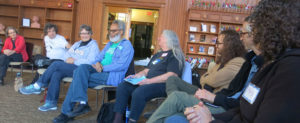
Saturday at UMASS – Ginny Schneider, Mike Levinson, Cathy Deppe, Alex Walker, Joanne Sheehan, Justin Becker, Clark Hanjian, and Mary Regan at a Saturday session at UMASS
The National War Tax Resistance Coordinating Committee actually does have formal meetings twice a year on the Sunday morning of our gathering weekends. This is the highest decision-making body of the organization. The November agenda includes setting the budget and objectives for the following year and dealing with proposals and changes (see page 8). Administrative Committee members, representatives of local groups, individuals who came for the weekend, and consultants made it through a packed agenda in our morning time slot. We
agreed on a proposal to consolidate some parts of our website into a Divest/Invest themed section for the coming tax season; to print newsletters in 2018 on yellow paper commemorating WWI “bond slackers”; and to give $500 to our affiliate, the San Diego Peace Resource Center, to support their tax season organizing. We also endorsed the Movement for Black Lives’ Platform, which includes a call for an immediate 50% reduction of the military budget and redirection of those funds to human and environmental needs.
Sam Koplinka-Loehr has worked for the past 15 months as NWTRCC Field Organizer, a temporary position created out of grant money. Sam wrote a lengthy evaluation along with recommendations for future field organizing work, and we will keep this document in front of us toward the next meeting. Sam has decided to focus on jobs in Philadelphia as of January 1, so
we’ll miss her work for NWTRCC but plan to stay in touch.
Thanks to Ginny Schneider, Sam Koplinka-Loehr, Alan Clemence, and Stellan Vinthagen and Debbie Weyl of the Resistance Studies Initiative for all their work organizing the weekend and to each of the presenters for their challenging contributions for us individually and as an organization.
— By Ruth Benn, with some borrowed text from weekend summaries by Erica Leigh and Sam Koplinka-Loehr.
Help keep NWTRCC strong and growing!
Nominations Open for NWTRCC’s Administrative Committee (AdComm)
The AdComm gives oversight to business operations, helps plan two gatherings each year, keeps in touch with consultants between meetings, and meets face-to-face at the May and November gatherings and by phone in Feburary and August.
We need to fill two seats, and new members will be selected from nominees at the May 2018 meeting. They serve as alternates for one year and full members for two years; travel to meetings is paid for full members. Each nominee will receive a nomination letter from the NWTRCC office with more details about what’s involved as a member of this important committee.
Call, email, or mail your nomination(s) to
NWTRCC, PO Box 150553
Brooklyn, New York 11215
800-269-7464 or Email
Deadline: March 15, 2018
PROFILE
Time for a Change
By Ruth Benn
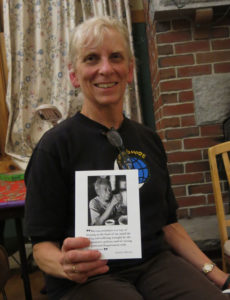 Change is coming for NWTRCC and for me. After nearly 15 years as NWTRCC Coordinator, I am planning to end my tenure at the May 2018 gathering in Los Angeles. Our November meeting in Massachusetts established a hiring committee. They are laying out a timeline for advertising (see the insert in this issue!) and the process of seeking a new Coordinator.
Change is coming for NWTRCC and for me. After nearly 15 years as NWTRCC Coordinator, I am planning to end my tenure at the May 2018 gathering in Los Angeles. Our November meeting in Massachusetts established a hiring committee. They are laying out a timeline for advertising (see the insert in this issue!) and the process of seeking a new Coordinator.
I took over from Mary Loehr at the wonderful conference in Santa Rosa, California, in May 2003. When I came to NWTRCC I had already been involved in war tax resistance for a couple decades, after learning about it as an intern with the American Friends Service Committee in Western Massachusetts. Pioneer Valley War Tax Resistance was the active group in the area, and who could have better inspirations than Wally and Juanita Nelson. Who could resist resisting after meeting them!
Eventually I landed on the staff of War Resisters League, and coordinating the war tax resistance program there became part of my job. I’ve been producing the annual “Where Your Income Taxes Really Go” flyer since 1987 both as a staff person and as a volunteer. I’m still active with the New York City WRL group. War tax resistance is part of our local organizing, so I’m hardly leaving this work behind — just this particular job.
NWTRCC just reached its 35th anniversary. That really is something quite remarkable for a peace group that organizes on an issue that is even at the fringe of the peace movement. NWTRCC has had great people in the Coordinator position over all those years, each of whom has contributed to the longevity of this group. I think much of that has to do with the inherent frugality of war tax resisters, the benefit we all feel from having a support organization, and the maintenance of a network of local activists who take responsibility to keep the organization going and not just rely on national staff.
At the same time, our local groups are getting smaller and are less able to support this coalition financially. We all see the need to bring in younger people, and the younger activists who’ve joined us already bring with them some new ways of talking about war and the issues of the day. I think NWTRCC is in pretty good shape right now, and it seems like a good time to make a change and bring in some new energy to move WTR into the future. I’ve also got some other work and dangling projects that need my attention, and it’s hard to get to those with the NWTRCC office in my home and the knowledge that there is always something I could or should be doing for NWTRCC.
Besides my impending departure, there are some other changes coming:
- The one-year Field Organizer position ends December 31, 2017. In addition, Sam Koplinka-Loehr chose to move on to other things and not continue as a paid consultant for NWTRCC, thus prompting some other shifts in consultant jobs.
- Erica Leigh will take over editing this newsletter, along with overseeing the weekly online blog and literature production as the newly designated Communications Consultant. The new budget includes funds for a 5-hour per week Social Media Consultant, which we will be looking to fill.
- The new Coordinator will be asked to do more field organizing and give fundraising more time and attention.
It’s been wonderful to meet and be in touch with so many of you around the country — and internationally — over the past 15 years. I have felt so lucky and honored to be able to get paid for work with goals in which I deeply believe. I just hope we can reach those goals one day!
This is not goodbye. You are likely to hear more from me before my tenure ends in May (and maybe even after that!).
JOB OPENING at NWTRCC
The National War Tax Resistance Coordinating Committee (NWTRCC) is looking for applicants for its Coordinator position, to start about May 2018.
NWTRCC, founded in 1982, is a national coalition of organizations and individuals who work together to support, coordinate, and publicize war tax resistance efforts. The Coordinator is the primary administrator for NWTRCC (responsible for office management, financial management, coordination with volunteers and other consultants, preparation for meetings, and fundraising). Other responsibilities are field organizing, counseling, and public relations.
A successful applicant has strong administrative and managerial talents, is skilled at working independently, enjoys working with a wide variety of personalities, has demonstrated fundraising skills, and has experience in and commitment to war tax resistance. The position is 25 hours per week, scheduled flexibly, and includes paid vacation, holidays, and sick time. All administrative expenses are covered except for office space. The Coordinator is responsible for providing office space. Compensation is about $20 per hour (about $27,000 per year).
NWTRCC expects a minimum commitment of three years.
For detailed information, request an applicant’s packet:
NWTRCC, PO Box 150553, Brooklyn, New York 11215 800-269-7464, or hiring@nwtrcc.org
Application deadline
FEBRUARY 15, 2018

